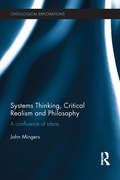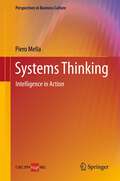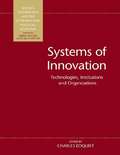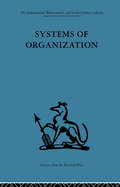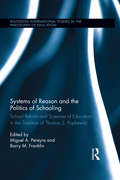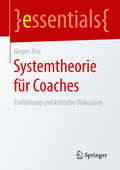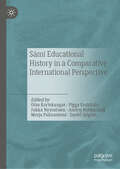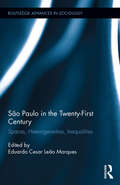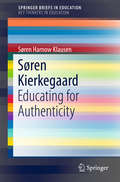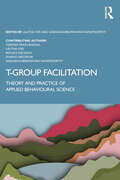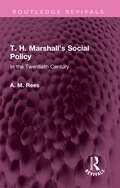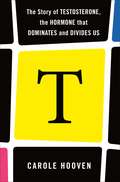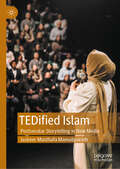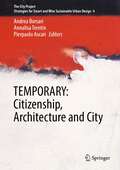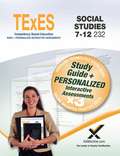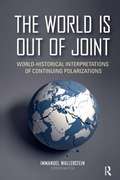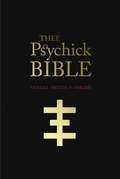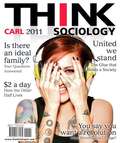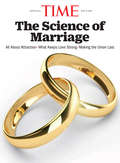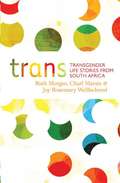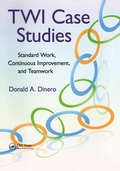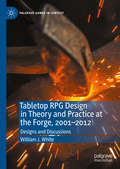- Table View
- List View
Systems Thinking, Critical Realism and Philosophy: A Confluence of Ideas
by John MingersSystems Thinking, Critical Realism and Philosophy: A Confluence of Ideas seeks to re-address the whole question of philosophy and systems thinking for the twenty first century and provide a new work that would be of value to both systems and philosophy. This is a highly opportune time when different fields – critical realism, philosophy of science and systems thinking – are all developing around the same set of concepts and yet not realizing it. This book will be of interest to the academic systems community worldwide and due to it's interdisciplinary coverage, it will also be of relevance to a wide range of scholars in other disciplines, particularly philosophy but also operational research, information systems, and sociology.
Systems Thinking: Intelligence in Action
by Piero MellaThe core belief underlying this book is that the most useful and effective models to strengthen our intelligence are system ones, developed following the logic of Systems Thinking. Such models can explore complexity, dynamics, and change, and it is the author's view that intelligence depends on the ability to construct models of this nature. The book is designed to allow the reader not only to acquire simple information on Systems Thinking but above all to gradually learn the logic and techniques that make this way of thinking an instrument for the improvement of intelligence. In order to aid the learning and practice of the Systems Thinking discipline, the author has abandoned a rigid formal language for a more discursive style. He writes in the first person, with an ample number of citations and critical analyses, and without ever giving in to the temptation to use formal mathematics.
Systems of Innovation: Technologies, Institutions and Organizations (Elgar Mini Ser.)
by Charles EdquistThe systems of innovation approach is considered by many to be a useful analytical approach for better understanding innovation processes as well as the production and distribution of knowledge in the economy. It is an appropriate framework for the empirical study of innovations in their contexts and is relevant for policy makers. This text is the result of the work within an international inter-disciplinary network or "working seminar" with the task of building a more solid and sophisticated conceptual and theoretical foundation for the continued study of innovations in a systemic context. The book has three parts. The first presents an overview and tries to work out some conceptual problems. In the second, the systems of innovation approach is related to innovation theory. Part three is devoted to increasing understanding of the functioning and dynamics of systems of innovation. There is also an introduction where the genesis and anatomy of different systems of innovation approaches are discussed and where the systems of innovation approach is characterized in nine dimensions.
Systems of Organization: The control of task and sentient boundaries
by A K Rice E J MillerTavistock Press was established as a co-operative venture between the Tavistock Institute and Routledge & Kegan Paul (RKP) in the 1950s to produce a series of major contributions across the social sciences. This volume is part of a 2001 reissue of a selection of those important works which have since gone out of print, or are difficult to locate. Published by Routledge, 112 volumes in total are being brought together under the name The International Behavioural and Social Sciences Library: Classics from the Tavistock Press. Reproduced here in facsimile, this volume was originally published in 1967 and is available individually. The collection is also available in a number of themed mini-sets of between 5 and 13 volumes, or as a complete collection.
Systems of Reason and the Politics of Schooling: School Reform and Sciences of Education in the Tradition of Thomas S. Popkewitz (Routledge International Studies in the Philosophy of Education)
by Miguel A. Pereyra Barry M. FranklinThe 1980s were an important decade for educational inquiry. It was the moment of the “linguistic turn,” with its emphasis on the role of language as a constructor of reality, a structuring agent for institutions such as schools, and a medium for translating knowledge into elements of power for processes of social regulation. Drawing on the work and insights of educational researcher Thomas S. Popkewitz, this book shows how the linguistic turn provided an alternative to both mainline educational research grounded in the ideals of political liberalism and the effort of neo-Marxists to challenge liberal thinking in favor of a scholarship based on class conflict and economic determinism.
Systemtheorie für Coaches: Einführung und kritische Diskussion (essentials)
by Jürgen KrizDas essential bietet eine prägnante Übersicht über zentrale Konzepte und Begrifflichkeiten, die häufig im Kontext systemischen Coachings vorkommen. Den Ausführungen liegt ein Ansatz zugrunde, der auf dem Boden interdisziplinärer Systemtheorie (,,Synergetik") als ,,Personzentrierte Systemtheorie" bekannt ist. Die dort entwickelten Konzepte und Prinzipien ermöglichen ein systemtheoretisch begründetes und konsistentes Verständnis bezüglich der Entstehung, Stabilität und Veränderung von Problemstrukturen. Damit lassen sich zentrale Aspekte und Fragen, die im Bereich des Coachings auftreten, auf systemtheoretische Weise betrachten, was es ermöglicht, das Handlungspotenzial im systemischen Coaching in konsistenter Weise weiterzuentwickeln und zu vertiefen.
SÍ SEÑOR: My Liverpool Years - THE LONG-AWAITED MEMOIR FROM A LIVERPOOL LEGEND
by Roberto FirminoA revelatory memoir from Liverpool legend and global football star Bobby Firmino.Master of the no-look goal and Anfield favourite, Roberto 'Bobby' Firmino, signed for Liverpool in July 2015. Over the next eight years - and seven winners' medals - he established himself as one of the club's most important players in recent years for his audacious skill, impressive goal scoring, and beaming smile.Jürgen Klopp saw Firmino as the on-pitch 'engine' that drove the club's counter-pressing strategy and together with Mohamed Salah and Sadio Mané, Firmino formed a formidable attacking trio. The Kop rewarded Roberto with the ultimate accolade - his own song: 'Sí, Señor, give the ball to Bobby and he will score.' Sí, Señor celebrates Firmino's cherished years in a red shirt and will remind fans why they fell in love with him in the first place.
SÍ SEÑOR: My Liverpool Years - THE LONG-AWAITED MEMOIR FROM A LIVERPOOL LEGEND
by Roberto FirminoA revelatory memoir from Liverpool legend and global football star Bobby Firmino.Master of the no-look goal and Anfield favourite, Roberto 'Bobby' Firmino, signed for Liverpool in July 2015. Over the next eight years - and seven winners' medals - he established himself as one of the club's most important players in recent years for his audacious skill, impressive goal scoring, and beaming smile.Jürgen Klopp saw Firmino as the on-pitch 'engine' that drove the club's counter-pressing strategy and together with Mohamed Salah and Sadio Mané, Firmino formed a formidable attacking trio. The Kop rewarded Roberto with the ultimate accolade - his own song: 'Sí, Señor, give the ball to Bobby and he will score.' Sí, Señor celebrates Firmino's cherished years in a red shirt and will remind fans why they fell in love with him in the first place.
SÍ SEÑOR: My Liverpool Years - THE LONG-AWAITED MEMOIR FROM A LIVERPOOL LEGEND
by Roberto FirminoA revelatory memoir from Liverpool legend and global football star Bobby Firmino.Master of the no-look goal and Anfield favourite, Roberto 'Bobby' Firmino, signed for Liverpool in July 2015. Over the next eight years - and seven winners' medals - he established himself as one of the club's most important players in recent years for his audacious skill, impressive goal scoring, and beaming smile.Jürgen Klopp saw Firmino as the on-pitch 'engine' that drove the club's counter-pressing strategy and together with Mohamed Salah and Sadio Mané, Firmino formed a formidable attacking trio. The Kop rewarded Roberto with the ultimate accolade - his own song: 'Sí, Señor, give the ball to Bobby and he will score.' Sí, Señor celebrates Firmino's cherished years in a red shirt and will remind fans why they fell in love with him in the first place.
Sámi Educational History in a Comparative International Perspective
by Merja Paksuniemi Otso Kortekangas Pigga Keskitalo Jukka Nyyssönen Andrej Kotljarchuk David SjögrenThis book provides a comprehensive overview of Sámi education in a historical and internationally comparative perspective. Despite the cross-national character of the Sámi population, academic literature on Sámi education has so far been published within the different nation states in the Sámi area, and rarely in English. Exploring indigenous educational history around the world, this collection spans from Asia to Oceania to Sápmi and the Americas. The chapters frame Sámi school history within an international context of indigenous and minority education. In doing so, two narrative threads are established: both traditional history of education, and perspectives on the decolonisation of education. This pioneering book will appeal to students and scholars of Sámi education, as well as indigenous education around the world.
São Paulo in the Twenty-First Century: Spaces, Heterogeneities, Inequalities (Routledge Advances in Sociology)
by Eduardo Cesar MarquesThis book analyzes in detail the main social, economic and special transformation of the city of São Paulo. In the last 30 years, São Paulo has become a more heterogeneous and less unequal city. Contrary to some expectations, the recent economic transformations did not produce social polarization, and the localized processes of spaces production (and the plural is increasingly important) are more and more key to define their respective growth patterns, social conditions, forms of housing production, service availability and urban precariousness. In other dimensions, however, inequalities remain present and strong and certain disadvantaged areas have changed little and are still marked by strong social inequalities. The metropolis remains heavily segregated in terms of race and class, in a clear hierarchical structure. The book shows that it is necessary to escape from dual and polarity interpretations. This did not lead to the complete disappearance of a crudely radial and concentric structure (not only due to geographic path dependence), but superposes other elements over it, leading to more complexes and continuous patterns. A general summary of these elements could perhaps be stated as pointing to greater social/spatial heterogeneity, accompanied by smaller, but reconfigured inequalities.
Søren Kierkegaard
by Søren Harnow KlausenThis book is a succinct guide to Søren Kierkegaard’s contribution to educational thought. Kierkegaard is not usually known as an educational thinker, but the book shows how his key notions and ideas are nevertheless highly relevant to educational theory and practice. It places them within the context of Kierkegaard’s philosophy and the philosophy of his time, while also exploring their significance to issues of contemporary concern, like the question of how far education should aim at fostering useful skills or support more ambitious goals. The central topics are Kierkegaard’s diagnosis of the limitations of objective knowledge and his corresponding emphasis on know-how, personal appropriation and subjective attitude; his analysis of more or less successful forms of self-realization; his ideas about fostering personal development through “indirect communication” and dialogue; and the elements, strengths and shortcomings of the ideal of self-cultivation (German Bildung).
T-Group Facilitation: Theory and Practice of Applied Behavioural Science
by Lalitha Iyer Sharad Sakorkar Sankarasubramanyan Ramamoorthy Tejinder Singh Bhogal Renuka Raj SinghThis book offers the core conceptual base for the practice of T-Group facilitation. Drawing from the fields of psychology, social psychology, sociology, diversity studies and Indian philosophical thoughts, this book is a great resource for enhancing the practice of T-Group facilitation, for both budding and established facilitators. It covers a wide range of theories on human development, self-awareness, interpersonal interactions, groups and change. Individual and group identities, diversity, inclusion and social hierarchies are explored in detail here. The authors offer a model of T-Group facilitation based on 50 years of experience within the Indian Society for Applied Behavioural Science (ISABS). This model is useful not only for fellow practitioners of T-Groups but also for anyone engaged in facilitating groups, organizations and communities globally. This book helps one to reflect, develop and sharpen one’s competencies, values and ethics in this field. The chapters are embedded with activities, quizzes, case studies and exercises to facilitate a deeper understanding of the various elements used in the book. This book will be of interest to students, teachers and practitioners of psychology, social psychology, management studies and organizational development. It will also be useful for T-Group facilitators, facilitators of experiential groups and related fields.
T. H. Marshall's Social Policy: In the Twentieth Century (Routledge Revivals)
by A. M. ReesOriginally published in 1965, Social Policy became a classic text and one of the best-known and most widely-used textbooks in social administration. This Routledge Revival reissues the 5th edition of 1985. T. H. Marshall’s masterly and unrivalled analysis of the development of welfare policies between 1890 and 1945 remains unchanged. The second half the book, with a chapter on every ‘arm’ of the welfare state, retains Marshall’s original structure but was completely rewritten and updated by A. M. Rees, considering developments to the end of 1984. An indispensable introductory text, this is a key book for all students of social administration, economic and social history and 20th Century politics.
T: The Story of Testosterone, the Hormone that Dominates and Divides Us
by Carole HoovenThrough riveting personal stories and the latest research, Harvard evolutionary biologist Carole Hooven shows how testosterone drives the behavior of the sexes apart and how understanding the science behind this hormone is empowering for all.Since antiquity—from the eunuchs in the royal courts of ancient China to the booming market for “elixirs of youth” in nineteenth-century Europe—humans have understood that typically masculine behavior depends on testicles, the main source of testosterone in males. Which sex has the highest rates of physical violence, hunger for status, and desire for a high number of sex partners? Just follow the testosterone.Although we humans can study and reflect on our own behavior, we are also animals, the products of millions of years of evolution. Fascinating research on creatures from chimpanzees to spiny lizards shows how high testosterone helps males out-reproduce their competitors. And men are no exception.While most people agree that sex differences in human behavior exist, they disagree about the reasons. But the science is clear: testosterone is a potent force in human society, driving the bodies and behavior of the sexes apart. But, as Hooven shows in T, it does so in concert with genes and culture to produce a vast variety of male and female behavior. And, crucially, the fact that many sex differences are grounded in biology provides no support for restrictive gender norms or patriarchal values. In understanding testosterone, we better understand ourselves and one another—and how we might build a fairer, safer society.
TEDified Islam: Postsecular Storytelling in New Media
by Jasbeer Musthafa MamalipurathThis book represents one of the initial comprehensive studies of TED Talks on Islam. It situates TED Talks on Islam as postsecular (secular’s renewed interest in faith) discourse and asks how TED represents and narrates Islam. It also examines the perspectives of both Muslim and non-Muslim TED viewers about TED’s storytelling strategies as well as on the platform. Finally, the book studies the features of the authority that both Muslim and non-Muslim TED speakers embody as ‘spokespersons of Islam’. By doing so, this book offers an empirical and context-oriented understanding of postsecular storytelling by problematising the secular translations of Islam.
TEMPORARY: Citizenship, Architecture and City (The City Project #4)
by Andrea Borsari Annalisa Trentin Pierpaolo AscariThis book offers a comprehensive overview of forces shaping urban renewal and the sustainable and inclusive transformation of contemporary cities. It discusses temporariness and uncertainty of citizenship, participation, and inclusion, as well as the energy and digital transformation, merging different perspectives, such as the social, philosophical, economic, and architectural ones. Based on revised and extended contributions to the International Congress “TEMPORARY: Citizenship, Architecture and City", held virtually on November 20-21, 2022, from the University of Bologna, this book offers extensive information and a thought-provoking reading to researchers in architecture, anthropology, social and environmental policy, as well as to professionals and policy makers involved in planning the city of the future.
TExES Social Studies 7-12: Teacher Certification Exam Guide
by Sharon WynneAre you ready to teach Social Studies in Texas? Use our high quality study guide to help you pass your teacher certification exam and advance your career. Our TExES Social Studies 7-12 study guide offers total preparation for prospective Texas teachers to get ready for the TExES Social Studies 7-12 exam. Three 120 question skill-aligned tests cover the following Domains: I. World History (15%), II U. S. History (20%) III. Texas History (13%) IV. Geography, Culture and the Behavioral and Social Sciences (13%) V. Government and Citizenship (13%) VI. Economics and Science, Technology and Society (13%) VII. Social Studies Foundations, Skills, Research and Instruction (13%). These are broken down to 9 Competencies, and further to 70 Skills. Utilizing this guide will ensure that you have experience with all of the specific competencies and skills within the three Domains. The TExES Social Studies 7-12 (232) study guide is designed to assess whether an examinee has the requisite knowledge and skills that an entry-level educator in this field in Texas public schools must possess. Our three tests each contain 140 skill-aligned multiple-choice questions based on the Social Studies 7-12 test framework. Questions on this test range from grades 7-12. Common Core and TEKS standards have been added to this edition. As you prepare for your exam, have confidence knowing that the information provided has been correlated directly to Texas's expected teaching and learning skills, and is the best way to help guide you to success on your TExES Social Studies Exam.
THE WORLD IS OUT OF JOINT (E): World-Historical Interpretations of Continuing Polarizations
by Immanuel WallersteinThe dominant view in social science has been that the modern world shows a pattern of linear development in which all positive social trends rise (albeit at an uncertain speed) toward a relatively homogenized world. In the post-1945 period, some analysts contested this linear model, arguing that the modern world was rather one of escalating polarization. Their view was strengthened by the separate emergence within the natural sciences of complexity studies, which suggested that natural systems inevitably moved away from equilibrium, and at a certain point bifurcated radically.This book, based on a truly collaborative international research project, evaluates the empirical evidence in this debate in order to (1) give an adequate portrayal of the historical realities of the world-system, (2) draw a nuanced assessment about this debate, and (3) provide the basis on which we can not only envisage probable future trends but also draw conclusions about the policy and/or political implications of past and future research.The work of ten research clusters, based on crucial topics of overlapping nodes of social activity, provides a vantage-point with which to assess the basic issue; a clear picture emerges of "world-historical interpretations of continuing polarizations."
THEE PSYCHICK BIBLE
by Genesis Breyer P-Orridge Jason Louv Carl AbrahamssonThee Temple ov Psychick Youth (TOPY) will be remembered for its crucial influence on youth culture throughout the 1980s, popularizing tattooing, body piercing, "acid house" raves, and other ahead-of-the-curve cultic flirtations and investigations. Its leader was Genesis P-Orridge, co-founder of Psychick TV and Throbbing Gristle, the band that created the industrial music genre.The limited signed cloth edition of Thee Psychick Bible quickly sold out, creating demand for any edition of this 544-page book, which will be available in a handsome smyth-sewn paperback edition with flaps and ribbon. According to author Genesis Breyer P-Orridge, "this is the most profound new manual on practical magick, taking it from its Crowleyan empowerment of the Individual to a next level of realization to evolve our species."
THINK Sociology
by John D. CarlWith an engaging visual design, 15 page chapters, and readings from popular trade titles, THINK Sociology is the introductory Sociology text your students will read. THINK Sociology is informed with the latest research and the most contemporary examples, allowing you to bring current events directly into your classroom with little additional work. An engaging visual design developed with the benefit of extensive student feedback will appeal to your students and deliver the core concepts of Sociology in a way that they can actually understand.
TIME The Science of Marriage: All About Attraction - What Keeps Love Strong - Making the Union Last
by The Editors of TIMEEveryone wants to know the secret to getting and staying married. Research shows that married people are healthier than their single or divorced peers and that they tend to make more money and to report being far happier. But how to get there? In this special edition of TIME, we reveal:The new research on attraction and desire: what stokes it and what whittles it awayThe latest science on how a secure attachment to a spouse can measurably change your brain and protect your body from stressGreat advice from literature on love and commitmentWhat a healthy sex life looks likeThe one trait every marriage needsMoney moves every couple should makeWhy the divorce rate is at a 30-year low
TRANS: Transgender life stories from South Africa
by Ruth Morgan Charl Marais Joy Rosemary WellbelovedFeaturing more than 20 original voices, all with a great deal to say about today’s transgender experience, this illuminating collection offers a brand-new tone for the literary world. These unique stories are interspersed with discussion chapters, body maps, and archival material. The true accounts collected here touch on the isolation and despair that many individuals in this marginalized group feel and each explains the need to counter negative stereotypes, reduce discrimination, and provide accurate information on gender identity. As the first South African collection of its kind, this narrative provides honest representations of transgender lives and offers visible, positive role models to other people facing similar experiences.
TWI Case Studies: Standard Work, Continuous Improvement, and Teamwork
by Donald A. DineroTWI Case Studies: Standard Work, Continuous Improvement, and Teamwork provides the insight of leading experts to assist in the execution of Training Within Industry (TWI) the game-changing business tool. Presented as a series of case studies from a range of corporations with a variety of products and needs, it illustrates the rebirth of TWI program
Tabletop RPG Design in Theory and Practice at the Forge, 2001–2012: Designs and Discussions (Palgrave Games in Context)
by William J. WhiteThis book provides an introduction to the Forge, an online discussion site for tabletop role-playing game (TRPG) design, play, and publication that was active during the first years of the twenty-first century and which served as an important locus for experimentation in game design and production during that time. Aimed at game studies scholars, for whom the ideas formulated at or popularized by the Forge are of key interest, the book also attempts to provide an accessible account of the growth and development of the Forge as a site of participatory culture. It situates the Forge within the broader context of TRPG discourse, and connects “Forge theory” to the academic investigation of role-playing.
